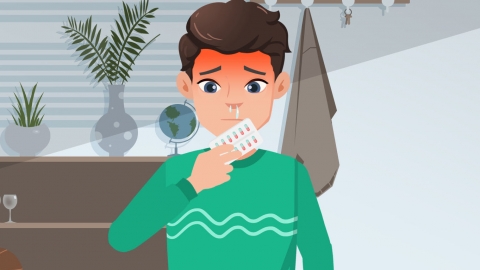Why does a runny nose occur when having a cold?
Generally, runny nose with clear mucus during a cold may be caused by factors such as nasal mucosal congestion and edema, increased secretion from nasal mucosal glands, viral infection, allergic rhinitis combined with a cold, or rhinovirus infection. It is recommended to seek timely medical attention, identify the underlying cause, and undergo symptomatic treatment under a doctor's guidance. Detailed explanations are as follows:

1. Nasal mucosal congestion and edema: During a cold, the nasal mucosa becomes irritated, causing blood vessels to dilate and leading to mucosal swelling. This enhances the secretory function of submucosal glands, producing clear nasal discharge accompanied by nasal congestion and itching, which worsens with exposure to cold. Applying a warm towel compress to the nasal area can improve local blood circulation and reduce congestion and swelling. Massaging both sides of the nostrils can also help relieve nasal congestion and decrease the flow of clear nasal mucus.
2. Increased nasal mucosal gland secretion: A cold-induced nasal mucosal inflammation stimulates glands to secrete large amounts of mucus, forming clear nasal discharge. This helps flush pathogens and protect the nasal mucosa, typically decreasing as the cold improves. Drinking more warm water to keep nasal mucosa moist, avoiding forceful nose-blowing to prevent mucosal damage, and using normal saline to irrigate the nasal cavity when necessary can help remove excessive secretions.
3. Viral cold: Infections caused by rhinoviruses, coronaviruses, and other viruses trigger acute inflammation in the nasal passages, irritating the nasal mucosa to secrete clear mucus. Symptoms may include sore throat, cough, and low-grade fever, with the illness typically lasting 7-10 days. Patients should rest adequately, ensure sufficient sleep, and follow medical advice to take medications such as compound paracetamol and amantadine capsules, Ganmaoling granules, or ribavirin granules to alleviate symptoms, inhibit viral replication, and promote recovery from the cold.
4. Allergic rhinitis combined with a cold: Individuals with allergic rhinitis experience increased nasal mucosal sensitivity during a cold. The dual stimulation of allergy and inflammation leads to increased clear nasal discharge, often accompanied by frequent sneezing and nasal itching, with symptoms worsening upon allergen exposure. Avoid allergen contact, wear a mask when outdoors, and follow medical advice to take antiallergic medications such as cetirizine hydrochloride tablets, loratadine syrup, or mometasone furoate nasal spray to reduce nasal mucosal reactions and decrease clear nasal discharge.
5. Bacterial rhinitis: Secondary bacterial infection following a cold exacerbates nasal inflammation. Initially presenting as clear nasal discharge, it may progress to purulent mucus as the condition develops, accompanied by worsening nasal congestion, headache, and visibly congested mucosa upon nasal examination. Patients should maintain nasal hygiene, follow medical advice to use anti-infective medications such as amoxicillin capsules, cefaclor capsules, or levofloxacin hydrochloride ear drops to control inflammation and reduce secretions.
During a common cold, it is important to stay warm to avoid worsening symptoms due to cold exposure. Maintain a light diet and consume more fruits rich in vitamin C to boost immunity. Ensure good indoor air circulation and avoid dry environments; using a humidifier to maintain appropriate humidity levels can reduce nasal mucosal irritation and promote recovery from the cold while decreasing nasal discharge.







